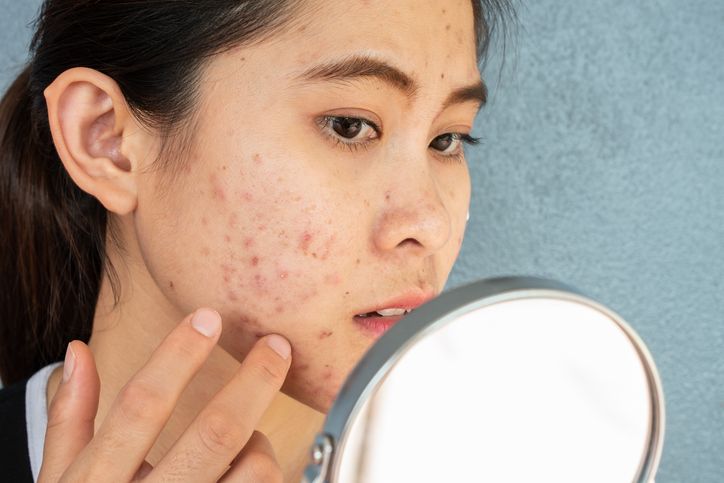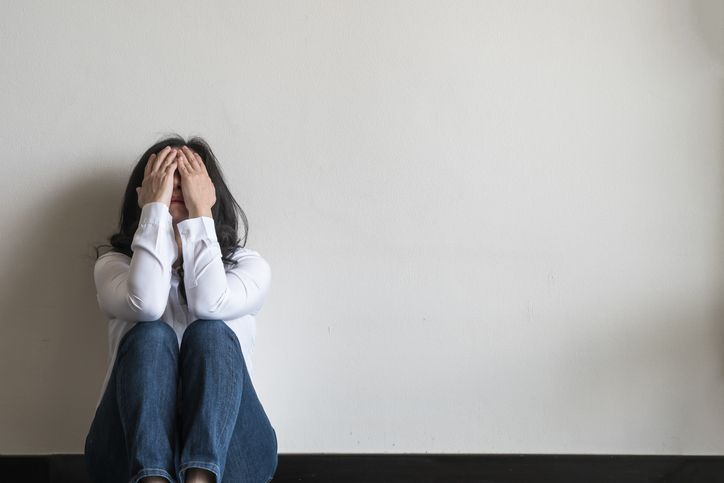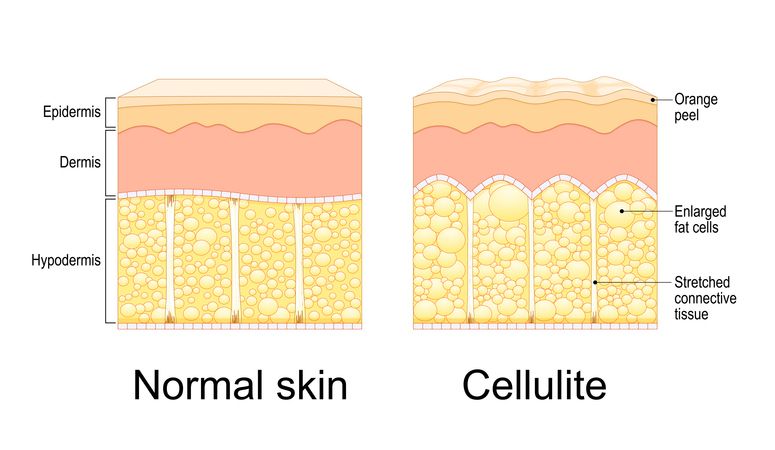Author: Natalie Ng|Updated: 17 June 2025
If your skin tends to break out after a rough couple of weeks, stress could be the reason. Stress related acne often shows up in patterns—like breakouts along your jawline or chin a week or two after a busy period or an emotional spike. Then once things calm down, your skin slowly clears up again. That’s because stress hormones can change how your skin behaves. They can mess with oil production, slow down how your skin heals, and make existing acne worse. Even if you stick to a regular skincare routine, it might not work the same when stress levels are high. You don’t need to track every single breakout, but noticing when they come and go can help you connect the dots. If acne keeps flaring up around the same time you feel overwhelmed or sleep-deprived, stress might be behind it. Next, we’ll look at some common signs that your acne is stress-related—and how to manage stress acne without overcomplicating your routine.

What Stress Related Acne Does to Your Skin

Stress shifts how your skin behaves beneath the surface
When you experience stress, your body produces more cortisol. This stress hormone triggers changes that increase oil production through the sebaceous glands, leading to clogged pores, acne causing bacteria buildup, and higher acne development—especially for acne prone skin.
These internal changes don’t always cause breakouts immediately. Over time, stress weakens the skin barrier, delays wound healing, and makes inflamed pimples more likely to appear and linger.
Hormonal fluctuations and inflammation work together
During stressful periods, hormonal fluctuations caused by cortisol can lead to:
• Increased sebum production that clogs hair follicles
• More dead skin cells that block pores
• Slower skin recovery and delayed healing of acne lesions
Together, these shifts worsen acne severity and make stress acne harder to manage.

Stress Related Acne Sign 1: Breakouts After High-Pressure Weeks

Breakouts don’t show up right away
Stress acne doesn’t appear during the stressful moment itself. It usually shows up two to three weeks later. This delay happens because your body takes time to respond to emotional stress. The stress hormones released during that period, like cortisol, gradually affect your skin.
Cortisol builds up oil production slowly
During high-stress periods, cortisol increases oil production in the sebaceous glands. This doesn’t happen all at once. Over time, that extra oil combines with:
• dead skin cells
• acne causing bacteria
• and buildup in the hair follicles
This combination leads to clogged pores and acne development, especially in those with acne prone skin.
Once the pores are clogged, inflammation follows. This makes acne worse and often leads to inflamed pimples or painful cysts. Stress related acne tends to appear along the jawline, chin, and lower cheeks—areas often linked with hormonal acne caused by hormonal fluctuations.
Track your breakouts alongside your stress
One simple way to see the connection is to keep a calendar. Mark stressful events, and then look 14 to 21 days later for acne breakouts. If you notice a pattern, emotional stress may be behind your acne severity.
Read More
Book Now to Experience
Acne Treatment
1 Minute Self-Registration
Date should not be before minimal date

Stress Related Acne Sign 2: Skin Doesn’t Clear Up Right After Stress Ends
Healing takes longer than most people expect
Many assume their skin should clear up the moment things calm down. While it’s true that emotional stress can trigger acne breakouts, the idea that relaxation instantly clears acne isn’t accurate. Your skin doesn’t work on the same timeline as your mood.
Once stress levels drop, your body gradually reduces cortisol output. This shift begins the healing process, but it doesn’t happen all at once. The effects of high stress on your skin take time to fade.
What usually happens as stress decreases
• Cortisol levels begin returning to normal within 24 to 48 hours
• Oil glands start regulating sebum production over the next 3 to 5 days
• Existing acne lesions take 1 to 2 weeks to fully heal
Even if you're no longer experiencing stress, acne prone skin still needs regular care. Inflammation from earlier breakouts continues, and clogged pores take time to clear. Stress and acne don’t work on a switch—you won’t see overnight results just because you’ve had a calm weekend.
Gentle care and patience support better skin health
Rather than expecting quick changes, it's more helpful to maintain a regular skincare routine using proven ingredients like salicylic acid or benzoyl peroxide. Stick to stress reduction techniques like deep breathing, adequate sleep, or light exercise to support your immune system and overall skin health.

Stress Related Acne Sign 3: Pimples Show Up in New or Unusual Areas
Breakouts usually appear where they always have
It’s easy to assume that emotional stress causes pimples to pop up in odd places, but that’s not how stress related acne works. There’s no strong evidence linking stress to changes in acne location. Your body’s oil production and hormone activity stay fairly balanced across your skin, even when you're under chronic stress.
If you’ve always broken out on your cheeks, chin, or T-zone, that’s likely where acne will continue to appear—even during high-stress periods. Stress doesn't suddenly shift your oil glands to new areas.
Other causes behind acne in new spots
If you’re noticing pimples in places you don’t usually break out, stress isn’t the most likely cause. These breakouts are often linked to other factors, such as:
• Touching your face more frequently when tired or anxious
• Wearing masks or tight clothing that causes friction
• Trying new skincare or makeup products
• Environmental factors like heat, sweat, or humidity
These issues can clog pores and trap bacteria, especially if your skin barrier is already compromised. For acne prone skin, even small habits can make a difference.
Focus on what consistently works
Instead of guessing what caused an unusual breakout, go back to the basics. Stick with a regular skincare routine using gentle cleanser, avoid touching your face, and watch how your skin responds to new products. If certain areas keep flaring up, tracking those changes can help you pinpoint true triggers—not just stress.
Book Now to Experience
Acne Treatment
1 Minute Self-Registration
Date should not be before minimal date

Stress Related Acne Sign 4: Acne Appears Alongside Other Stress Symptoms
Breakouts can happen at the same time—but aren’t always connected
It’s common to notice acne breakouts during high-stress periods. You might feel tired, irritable, or sleep-deprived—and spot new pimples at the same time. But just because these things show up together doesn’t mean stress is always causing the acne.
Your skin reacts to a mix of factors, not just emotional stress. Acne severity can increase due to changes in your habits that happen while you're stressed. These habits often fly under the radar but can affect your skin health more than you expect.
Common patterns that can worsen acne
Breakouts during stressful times may have more to do with how your routine changes than with stress itself. Some examples include:
• Skipping steps in your skincare routine due to a disrupted sleep schedule
• Eating different foods or more processed meals that affect hormone levels
• Touching your face more often out of nervousness or fatigue
• Not cleansing properly after sweating or wearing makeup for long hours
These changes can lead to clogged pores, increased sebum production, and more acne causing bacteria on the skin.
Breakouts during stress can be triggered by overlooked habits
It’s easy to misread the timing of a breakout. You might blame emotional stress when in reality, small lifestyle changes during that time are the real triggers. Stress and acne often overlap, but acne development usually involves several overlapping causes—including how you care for your skin during those periods.
Instead of assuming stress is always the cause, take a closer look at what shifts in your day-to-day life.

Stress Related Acne Sign 5: Acne Treatments Stop Working During Stress
Standard products may seem less effective under stress
If your usual skincare routine suddenly stops making a difference, stress could be interfering with how your skin responds. When your body is under pressure, cortisol levels stay elevated, which affects sebum production, triggers inflammation, and makes your skin more reactive. This can make stress related acne feel harder to control, even if you’re using trusted ingredients like benzoyl peroxide or salicylic acid.
It’s not that the treatments are ineffective—it’s that your skin’s environment changes during chronic stress, which can reduce how well those products work.
Why stress makes acne harder to treat
Stress impacts skin in subtle but important ways:
• Increases oil production through the sebaceous glands
• Disrupts the skin barrier, making it more sensitive and prone to irritation
• Delays wound healing, causing acne lesions to linger
• Boosts inflammation, which can worsen acne and make pimples more painful
When all of this happens together, it can feel like your treatments have stopped working, even if you’ve been regular with your routine.
If you've been using the same products for several weeks or months without improvement, it may be time to adjust your approach.
Book Now to Experience
Acne Treatment
1 Minute Self-Registration
Date should not be before minimal date

Stress Related Acne Sign 6: Breakouts Take Longer to Heal
Inflammation stays longer during high-stress periods
When you're dealing with emotional stress, you might notice your breakouts don’t heal as quickly as they usually do. Inflamed papules or painful cysts can stick around longer than expected, leaving behind red marks or swelling that lingers. This isn’t just a feeling—chronic stress can interfere with how well your skin repairs itself.
Stress hormones like cortisol affect immune function, which slows the healing of acne lesions. The more your skin stays inflamed, the longer it takes for pimples to flatten, fade, and disappear completely.
Factors that affect wound healing during stress
Several changes happen in the skin when cortisol levels stay high:
• The skin barrier weakens, making the skin more sensitive and reactive
• Inflammation increases, keeping acne lesions red and swollen
• Wound healing slows down, especially if acne is picked or irritated
• Bacterial growth can increase, especially with excess oil and clogged pores
Together, these factors delay how fast your skin recovers from acne breakouts.
Focus on steady care, not quick fixes
If your acne feels like it’s taking forever to go away, it might not be the severity—it could be your skin’s slower healing response. Picking at breakouts, skipping your routine, or using harsh products can make this worse.
Instead, focus on:
• Using calming ingredients like niacinamide or green tea extract
• Applying ice to reduce swelling for 1–2 minutes at a time
• Avoiding harsh scrubs or overuse of active ingredients
• Getting adequate sleep and sticking to regular meals for skin recovery
When you are stressed, your skin needs time and stable care to repair itself. Letting breakouts heal naturally while managing both external triggers and internal stress will help improve overall skin health without making acne worse.

Why Skincare Alone May Not Control Stress Related Acne
Stress weakens your skin’s natural defenses
When stress levels stay high, your skin doesn't function the same way it does under normal conditions. Even if you're using a regular skincare routine, you may still notice more breakouts, slower healing, and increased oiliness. That’s because stress hormones disrupt the balance between oil production, cell turnover, and skin barrier repair.
Products that normally help with mild acne may feel less effective when your skin is inflamed, dehydrated, or overloaded with excess oil.
Skincare has limits during emotional stress
Stress related acne is often affected by more than clogged pores. It involves internal changes that skincare products alone can’t fully address, including:
• Delayed wound healing that keeps acne lesions from fading
• Increased bacterial growth in oily areas
• Fluctuations in sebum production driven by stress hormones
• Weakened response to active ingredients like salicylic acid or benzoyl peroxide
Even the best ingredients can fall short if your skin is overwhelmed by chronic stress. When this happens, breakouts keep returning, acne scars stay visible longer, and the skin stays reactive.
Combining skincare with targeted support
This doesn’t mean your products don’t work—it means your skin may need extra help during stressful periods. In these cases, combining your skincare routine with a treatment that addresses deeper causes can make your results more reliable and visible.
If you're seeing signs that stress is making your acne worse, or that your usual routine isn't enough, it may be time to explore options designed specifically for stress related acne.
Book Now to Experience
Acne Treatment
1 Minute Self-Registration
Date should not be before minimal date

Daily Habits That Help Prevent Stress Related Acne
Small routines can improve skin recovery
Managing stress related acne doesn’t end with skincare. When you're under emotional stress, your daily habits can quietly affect oil production, inflammation, and acne development. Even with the right products, small lifestyle changes can make the difference between healing and ongoing breakouts.
During stressful periods, your immune system becomes less effective, and the skin barrier weakens. This makes your skin more reactive and slower to recover from acne lesions, especially if you're dealing with hormonal acne or already have acne prone skin.
Simple habits that support acne treatment
To reduce acne severity and help your skin stay balanced, focus on habits that protect the skin barrier and limit clogged pores:
• Sleep regularly: Poor sleep can trigger hormonal fluctuations and delay wound healing
• Cleanse gently twice a day: Helps remove dead skin cells and excess oil without damaging the skin
• Avoid face touching: Reduces bacterial growth and irritation in breakout-prone areas
• Use non-comedogenic products: Keeps hair follicles from getting blocked
• Apply targeted ingredients: Treatments with benzoyl peroxide or salicylic acid can reduce inflammation and acne causing bacteria
These steps won’t prevent stress entirely, but they can make a noticeable difference in how your skin handles it. Together with a regular skincare routine and stress reduction techniques, they help protect your overall skin health—even during high-pressure weeks.

How Unhealthy Habits Can Cause or Worsen Stress Related Acne
When life gets stressful, it’s easy to slip into habits that quietly sabotage your skin. Psychological stress doesn’t just affect your mood—it can also set off a chain reaction in your body that leads to acne breakouts. Stress hormones like cortisol ramp up oil production in your sebaceous glands, making your skin more prone to clogged pores and excess oil. But it’s not just the stress itself; the way you cope with it can make acne worse.
The link between stress, habits, and breakouts
Stress and unhealthy habits often go hand in hand, and together they can accelerate acne development. When you’re under pressure, your body experiences hormonal fluctuations—including a rise in androgen hormones that can trigger more oil production and inflamed skin. If you reach for comfort foods, skip sleep, or pick at your skin, you’re adding fuel to the fire. These habits can worsen acne severity, slow down wound healing, and make breakouts more frequent and stubborn.
Squeezing pimples or picking at your face, for example, can push bacteria deeper into the skin, leading to more inflammation and even scarring. Meanwhile, a poor diet high in sugar or processed foods can increase inflammation throughout your body, making acne breakouts more likely and harder to heal.
Examples of habits that sabotage your skin
Certain everyday habits can quietly undermine your skin health and make stress acne harder to manage:
• Poor diet: Eating lots of high-glycemic foods, dairy, or saturated fats can trigger inflammation and worsen acne severity.
• Inadequate sleep: Skimping on a good night’s sleep raises stress hormones, which can increase oil production and make breakouts more likely.
• Excessive smoking or alcohol: These habits cause oxidative stress and weaken your immune system, both of which can contribute to acne development.
• Poor hygiene: Forgetting to wash your hands or cleanse your face regularly can introduce bacteria and clog pores, setting the stage for new acne.
Each of these habits can cause acne or make existing breakouts worse, especially when combined with psychological stress.
How to break the cycle and support healing
You can take back control by making small, sustainable changes that support both your skin and your stress levels:
• Eat a balanced diet: Focus on fruits, vegetables, and whole grains to reduce inflammation and support healthy skin.
• Stick to a consistent skincare routine: Use gentle cleansers with ingredients like salicylic acid or benzoyl peroxide to keep oil production in check and prevent clogged pores.
• Prioritize adequate sleep: Aim for a regular sleep schedule to help regulate stress hormones and promote overall skin health.
• Practice stress reduction techniques: Try deep breathing, meditation, or yoga to manage stress and keep your skin calm.
• Avoid squeezing pimples: Let breakouts heal naturally to prevent scarring and further inflammation.
By managing stress and making healthier choices, you can help prevent stress acne from taking over and support your skin’s natural healing process.

Acne Treatment for Stress Related Acne: Clear Skin Without the Struggle
Stress related acne can be stubborn. Even with regular skincare, breakouts caused by chronic stress, hormonal fluctuations, and excess oil don’t always respond to typical treatments. That’s where targeted support like the Acne Treatment comes in.
Designed for acne prone skin, this treatment tackles the root issues of stress acne—clogged pores, overactive sebaceous glands, and delayed wound healing. It doesn’t rely on oral medications or harsh procedures. Instead, it uses a gentle but thorough three-step method that works with your skin, not against it.
How the Acne Treatment Works
• Deep pore cleansing: A dual spiral suction and drainage device exfoliates dead skin cells and clears out clogged pores. This helps calm existing inflammation caused by acne causing bacteria and stress-triggered oil buildup.
• Hydration and oil balance: A hydrating serum is infused directly into the skin to soothe oil glands, balance sebum production, and improve skin barrier function. This step helps prevent stress acne from returning.
• Collagen support: The treatment promotes collagen growth, which improves skin texture and reduces acne scars over time.
Why the Acne Treatment Supports Stress Acne Recovery
• Non-invasive: There’s no cutting, no needles, and no downtime.
• Safe for inflamed skin: The method is suitable for mild acne to severe acne and doesn’t aggravate already sensitive skin.
• Addresses multiple skin concerns: It targets acne, blackheads, whiteheads, dullness, and enlarged pores—all of which can worsen under emotional stress.
• Helps regulate oil production: A key advantage for those whose stress makes their acne worse due to increased sebum output.
If stress acne has been affecting your confidence or slowing down your skin recovery, this treatment can help support your routine and speed up visible improvement.
Book your Acne Treatment session today and take one step closer to healthier, clearer skin.
New Beauty's Acne TreatmentBook Now to Experience
Acne Treatment
1 Minute Self-Registration
Date should not be before minimal date
FAQ
Can stress cause acne even if I’ve never had skin problems before?
Yes, stress can lead to acne breakouts even in people who haven’t dealt with acne before. When stress hormones like cortisol increase, they trigger oil glands to produce more sebum. This excess oil can mix with dead skin cells and bacteria, clogging hair follicles and leading to new breakouts. Emotional stress can also affect your immune system and delay wound healing, both of which can contribute to acne development even in previously clear skin.
Is stress related acne the same as hormonal acne?
They can overlap, but they’re not exactly the same. Stress related acne is caused by increased stress hormones, particularly cortisol, which can raise oil production and trigger inflammation. Hormonal acne is usually tied to fluctuations in androgen hormones, especially around the menstrual cycle, pregnancy, or from certain medications like birth control pills. Both can appear in similar areas, like the jawline and chin, but stress acne tends to flare up after emotionally intense periods.
Does stress acne go away on its own?
Stress acne can improve when stress levels drop, but it usually doesn’t go away entirely without support. Because stress affects multiple aspects of your skin health—like oil production, skin barrier strength, and healing speed—you’ll likely still need a regular skincare routine and stress reduction techniques to keep breakouts from coming back. For some people, targeted treatments can also help prevent scarring and reduce acne severity more quickly.
Can certain foods worsen stress related acne?
While food isn’t a direct cause of acne, some eating habits during stressful times can contribute to flare-ups. High-sugar snacks, greasy foods, or skipping meals can influence hormone levels and increase inflammation. These changes may worsen acne prone skin, especially if your sebum production is already elevated from stress. Eating a balanced diet with enough water, vegetables, and healthy fats can support overall skin health and help prevent stress acne from getting worse.
How can I tell if my breakouts are caused by stress or something else?
Breakouts caused by stress often follow a pattern: they appear 1–3 weeks after a high-pressure period, tend to show up along the jawline or chin, and may feel more inflamed or stubborn than usual. If you track your stress levels and breakout timing, you may notice a connection. But other triggers—like new skincare products, environmental factors, or certain medications—can also play a role. Keeping a skin diary is a good way to spot what’s really causing your flare-ups.
Recommended Articles
COPYRIGHT© NEW BEAUTY MANAGEMENT LIMITED 2026. ALL RIGHT RESERVED.




